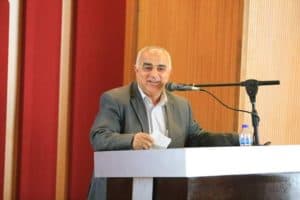After the end of World War II, the Arab-Israeli confrontation has a significant impact on the geopolitics of the entire Middle East. The international community, it would seem, is trying to distance itself from the search for compromise solutions that would suit all parties to the conflict, thereby creating the basis for disappointment in both Israel and Palestine. At present, the conflict between the parties is developing in leaps and bounds: either creating the basis for a full-scale escalation, or decaying during negotiations. Thus, the Arab-Israeli tension is rapidly acquiring the features of an insoluble conflict, which requires constant attention from the international community.
Specifically for World Geostrategic Insights, we talked about this with Ayman Yousef, professor in Conflict resolution in the Arab- American University, Palestine.

1. On August 26, 2019, Israel launched a missile strike on the positions of the Popular Front for the Liberation of Palestine, used by the Hezbollah movement in the Bekaa region in northern Lebanon. In response, Lebanese President Michel Aoun, following talks with UN Special Representative, Jan Kubis, officially declared that Tel Aviv had declared war. In turn, the leader of the Hezbollah movement Hassan Nasrallah and the head of Palestine, Mahmoud Abbas, sharply condemned the actions of Israel and expressed their readiness to immediately attack Tel Aviv’s targets. Does the presented military provocation in Lebanon testify to the start of another escalation of the Arab-Israeli conflict? Does Beirut really intend to launch hostilities against Israel?
– Israel has recently hit many targets in Lebanon, Syria, Iraq and the Gaza Strip as part of a well-planned strategy to reach “enemies everywhere.” However, I don’t think that Lebanon or even Hezbollah will take a significant response, because, since 2006, Israel has managed to strike a balance between its own interests and those of the Lebanese government and Hezbollah. However, Hezbollah may respond to the recent Israeli attack in Lebanon, but this reaction will be limited and, most likely, delayed in time.As for Michel Aoun’s loud statement, now there are no objective prerequisites for Beirut to launch military operations against Israel: Moreover, the Lebanese government is well aware that in the event of a military clash with the IDF, Beirut has virtually no chance of victory without attracting additional forces from the international community, which is completely unwilling to quarrel with Israel. Auna declaring war is ordinary demagogy, which is designed solely for the public display of discontent, while no real action will follow.
2. It is worth noting that against the backdrop of the upcoming attempt by Benjamin Netanyahu and the Likud political party led by him to form a coalition government in Israel, the military incident that occurred in Lebanon can be used as an excuse for an internal political bargaining, through which Benjamin Netanyahu intends to get a majority of voters . Is it really? How can the “Lebanese incident” affect the outcome of the upcoming Israeli elections and the Palestinian Authority’s policy regarding Tel Aviv?
– The political map in Israel is in turmoil, because there is not a single political party that could firmly determine the majority in the next election. Voter votes are scattered across a wide range of political parties and forces on the right, left, and center. Benjamin Netanyahu is still in a good position to get 30 to 33 seats in the Israeli parliament, but this will most likely not help him form a stable government. Later Benjamin Netanyahu will be forced to join other forces, including right-wing and Jewish fundamentalists. Strategically, I feel that the recent Israeli air strikes in Syria, Lebanon, Iraq and Gaza have the intention and purpose of improving Benjamin Netanyahu’s position in the next election.
Thus, he is trying to convey to the Israeli voters the message that he is the most reliable and charismatic leader who can sail with the Israeli nation across the stormy ocean. In this regard, he may launch a wide campaign to threaten not only Hezbollah, but also Palestine. However, active military action is unlikely to be expected before the end of the Israeli election process. In the end, Benjamin Netanyahu is very at risk for his muscles, because in the event of a tough reaction from Hezbollah, Iran, Syria or Lebanon, he could provoke protests among the Israeli electorate, which will begin to show open dissatisfaction with the military failures of the current Prime Minister.
In turn, amid regular social protests, it will be extremely difficult for Benjamin Netanyahu to come to an agreement with the opposition and form a coalition government. Therefore, he is cautious: inflicting a series of local military attacks on opponents, he expects expression of support from the local electorate. In any case, there is no reason to expect large-scale military operations by the IDF before the Election Day.
3. It should be assumed that the “Lebanese incident” may result in aggravation of domestic political processes in Palestine itself, where Mahmoud Abbas, by using the occasion given to him for yet another criticism of Israel, will seek to strengthen his position not only in the international arena, but in the domestic audience . For this reason, Moscow will also show a desire to use the theme of military provocation in Lebanon to resume negotiations between Palestine and Israel. Is it possible under such conditions to assert that Palestine will be able to obtain any political advantages as a result of the “Lebanese incident”? Do the possible benefits that Palestine, in general, and Mahmoud Abbas, in particular, reflect the interests of Moscow in resolving the Arab-Israeli conflict?
– The main strategic goals of Russia so far are to support the Syrian regime, maintain strong ties with Iran and try to improve the balance of power in the Middle East in its favor. Russian President Vladimir Putin may take the initiative to invite Benjamin Netanyahu and Mahmoud Abbas to an official meeting in Moscow. However, this Russian step – in case this happens – will be considered a real breakthrough due to various facts and variables, including the right orientation of the current Israeli government and the weak position of Mahmoud Abbas, given the continued internal fragmentation and internal split in Palestine, in addition to Israeli strategies for normalizing relations with some Arab countries in the Persian Gulf.
4. On August 26, 2019, the IDF concentrated an attack force on the border due to the tense situation in the north of Israel. Such a redeployment was due to recent events, including in the Gaza Strip, from where Israeli territory underwent a series of missile strikes. In addition, the threat of invasion by Hezbollah and Iran poses Israel a choice of a preventive response: either, without waiting for the opponents to take active action, be the first to strike at their positions, or try to neutralize tensions through diplomatic procedures. Under these conditions, which scenario is most preferable for Tel Aviv? Is Israel ready to negotiate with Hezbollah and Tehran, or is it based on the view that war is the only way to solve problems?
– Iran’s Hezbollah attacks in response to the current Israeli air attacks in Lebanon, Syria and Iraq will take place – if possible – in the form of a limited military operation against certain Israeli targets in northern Israel near the border with Lebanon and Syria. However, neither Hezbollah nor Iran have any military potential or desire to invade Israel in the future. In the near future, a large-scale war is not expected for military, political, strategic reasons and reasons. In turn, Tel Aviv, despite the commitment to the hard line, is not ready for full-scale military action. Therefore, the parties to the conflict will have to agree among themselves.
5. Recently, the US State Department excluded Palestine from the list of states and territories published on the information resource of the Office of the Middle East, which was officially announced by spokesman for the Palestinian Authority Nabil Abu Rudein. Does the presented fact prove that the problem of Palestine status has already been resolved for the United States, despite the fact that under the terms of the Jared Kushner plan, Palestine is still recognized as a state entity? What actions will the Palestinian Authority follow if the White House administration makes a real attempt to eliminate it under Israeli pressure? What future awaits Palestine?
– Removing the name of Palestine from US official publications and reports from the US Department of State is part of the moral and psychological war of the White House administration against the Palestinians. Donald Trump has already made many decisions that are considered anti-Palestinian: the controversial decision regarding refugees, the Jerusalem Campaign, and the cessation of funding for most Palestinian programs. In other words, this US decision reflects American one-sidedness towards the Palestinians and in support of the right-wing forces in Israel. Palestine, in turn, can respond to a policy of discrimination using methods of public diplomacy and the creation of an international military opinion society.







